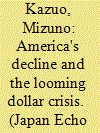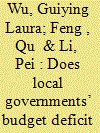|
|
|
Sort Order |
|
|
|
Items / Page
|
|
|
|
|
|
|
| Srl | Item |
| 1 |
ID:
086866


|
|
|
|
|
| Publication |
2008.
|
| Summary/Abstract |
Ten years of excessive consumption have severely weakened the balance sheets of American households. And housing prices are likely to drop much further than they already have, leading to more defaults on mortgages. Banks will have a tremendous load of bad loans to write off, and they will require injections of public funds. The US government will need to seek support from other countries, which may be reluctant to buy bonds denominated in dollars. The prospect of a dollar crisis is upon us.
|
|
|
|
|
|
|
|
|
|
|
|
|
|
|
|
| 2 |
ID:
120631


|
|
|
|
|
| Publication |
2013.
|
| Summary/Abstract |
Commodity housing has become a major engine of urban restructuring and social change in China. It is alleged to aid growing residential segregation and urban fragmentation. In this context, housing price is viewed as an important sorting mechanism. This article investigates this claim by looking at Guangzhou's housing market and analysing data of 797 commercial housing estates. It analyses the development of commodity housing and the trends of housing prices in the city and maps the locational patterns of high, middle, or low housing affordability within this sector.
|
|
|
|
|
|
|
|
|
|
|
|
|
|
|
|
| 3 |
ID:
143398


|
|
|
|
|
| Summary/Abstract |
Budget deficit has been a common fiscal pressure facing Chinese cities since the 1994 fiscal reform. Meanwhile, land lease sales have become a significant off-budgetary revenue to local governments since 2003. This paper investigates whether financing budget deficit is an important driving force of the recent soaring housing prices when local governments function as the monopoly supplier of urban land. A conceptual framework is developed to illustrate a transmission mechanism from budget deficit to housing prices. This leads to an empirical model consisting of two simultaneous structural equations for housing prices and land prices. Using data for the 35 major Chinese cities from 2003 to 2011, an empirical exercise shows that although budget deficit has a positive effect on land prices, it is the factors from demand side, such as amenities, income and the user cost of housing capital, that have been pulling up the housing prices.
|
|
|
|
|
|
|
|
|
|
|
|
|
|
|
|
| 4 |
ID:
161818


|
|
|
|
|
| Summary/Abstract |
In a similar way to the stock market, the housing market in China has often been portrayed as highly speculative, giving rise to “bubble” concerns. Over the last decade, residential prices increased every year on average by double digits in Beijing or Shanghai. However many observers and researchers argue that fundamentals of the housing sector, both sector-specific and macroeconomic, may have been the driving force behind housing price volatility. While existing empirical work exclusively relies on the government housing prices which may suffer from the well-documented downward bias, this paper uses original high frequency unit price as well as transaction series for the residential resale housing markets of Beijing and Shanghai between January 2005 and December 2010 to test alternative hypotheses about housing prices volatility.
|
|
|
|
|
|
|
|
|
|
|
|
|
|
|
|
| 5 |
ID:
166366


|
|
|
|
|
| Summary/Abstract |
Fracking drilling has opened a discussion on the role of technological developments in economies engaged in shale oil and gas formations. Oil and natural gas production opened new possibilities for employment benefits and housing prices decreases. This paper explores, for the first time, the impact of fracking on housing prices across Oklahoma's counties, spanning the period 2000–2015. Through panel methods, the findings show a positive effect on housing prices, while this positive effect gains statistical significance only over the period after the 2006 fracking boom. The results survive a robustness check that explicitly considers distance and groundwater-dependency issues.
|
|
|
|
|
|
|
|
|
|
|
|
|
|
|
|
| 6 |
ID:
175197


|
|
|
|
|
| Summary/Abstract |
A fictitious economy is the product of a highly developed economy, and is represented by bank capital, stocks, and bonds. Based on the economic reality of China's continuously expanding fictitious economy and rapidly rising housing prices in recent years, a structural vector autoregressive model is constructed and employed to show that, in the short term, the fictitious economy contributes most to the fluctuations in housing prices, followed by the interest rate, while money supply plays a very small contributory role. However, in the long term, the influence of the fictitious economy decreases, and the monetary policy and real economy will be the main factors influencing changes in housing prices.
|
|
|
|
|
|
|
|
|
|
|
|
|
|
|
|
| 7 |
ID:
158152


|
|
|
|
|
| Summary/Abstract |
The conspicuous rise in Israel’s housing prices from 2008 to date, after the stable prices in the early 2000s, has raised concerns of a property bubble in the Israeli economy. The grave effects of real estate bubbles that emerged in various countries around the world throughout history and led to severe long-term economic crises within the country and elsewhere add to the concern about such occurrences in the Israeli economy. This article focuses on the current effects of the real estate bubble on Israeli society at the preliminary stage, and examines the sociodemographic implications of Israel’s rise in housing prices and its impact on several social parameters, such as the average number of members in a household, Israel’s residential density, age at marriage, the extent of emigration from the country among the young, the population’s spread to peripheral areas, the inequality index, and more.
|
|
|
|
|
|
|
|
|
|
|
|
|
|
|
|
| 8 |
ID:
185199


|
|
|
|
|
| Summary/Abstract |
The two biggest stories of 2021 in South Korea were a cutthroat presidential nomination and the nationwide outcry over soaring housing prices. Both the ruling and opposition parties had gone through a noisy and murky nomination process. In 2021, housing prices continued to rise, causing citizens’ anxiety and anger to reach their peak, and the president apologized for the failure of the real estate policy. Despite the maladministration, president Moon Jae-in, unlike previous presidents, did not become a lame duck. Meanwhile, the popularity of Hallyu, or the Korean Wave, continued with the success of the movie Minari, K-pop band BTS, and the Netflix drama series Squid Game.
|
|
|
|
|
|
|
|
|
|
|
|
|
|
|
|
|
|
|
|
|